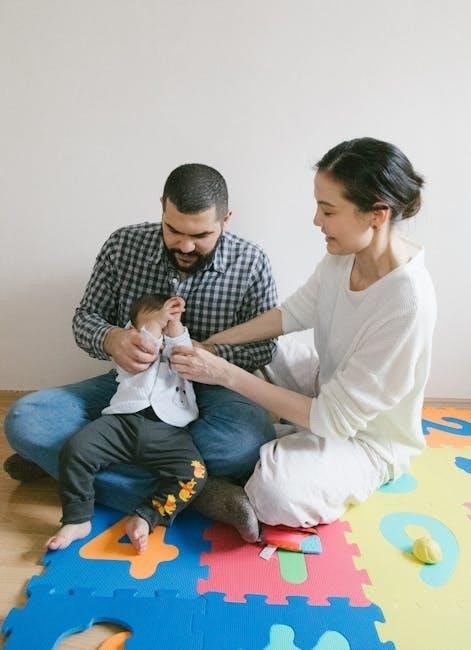Emotionally immature parents often lack empathy and struggle to provide emotional support, leaving their children with unmet needs. This can lead to challenges in adulthood, such as poor self-esteem and difficulty in forming healthy relationships. Understanding this dynamic is crucial for healing and personal growth.
Understanding Emotional Immaturity in Parents
Emotionally immature parents often struggle with empathy, self-regulation, and taking responsibility for their actions. They may prioritize their own needs over their children’s, creating an environment lacking emotional support. This immaturity can manifest as irresponsibility, dependence, or self-involvement, hindering healthy parent-child dynamics. Such parents may avoid accountability, resist change, and fail to model emotional intelligence, leaving their children without guidance on how to navigate emotions or relationships effectively. Recognizing these patterns is the first step toward understanding their impact on personal development.
The Impact on Children and Adult Relationships
Children of emotionally immature parents often develop traits like limited empathy, difficulty trusting others, and a fear of abandonment. These challenges persist into adulthood, affecting relationship dynamics. Adult children may struggle with communication, intimacy, and setting boundaries. They might also exhibit people-pleasing behaviors or overly depend on others for validation. These patterns can lead to strained personal and professional relationships, highlighting the long-lasting effects of emotionally immature parenting on emotional and social development.
Types of Emotionally Immature Parents
Emotionally immature parents can be categorized into types such as emotionally absent, dismissive, or narcissistic. Each type exhibits unique behaviors that significantly impact a child’s emotional development.
The Emotionally Absent Parent
Emotionally absent parents are physically present but fail to provide emotional support or validation. They often lack empathy, leaving their children feeling unseen and unimportant. This can lead to feelings of isolation and low self-worth. In adulthood, individuals may struggle with trusting others or forming intimate relationships. Healing involves recognizing this pattern and actively seeking supportive connections to fill the emotional void left by their parents’ unavailability. Understanding this dynamic is the first step toward personal growth and emotional recovery.
The Dismissive or Rejecting Parent
Dismissive or rejecting parents often invalidate their child’s emotions, making them feel unimportant or unheard. This emotional rejection can lead to deep-seated feelings of inadequacy and low self-esteem. Such parents may prioritize their own needs over their child’s, fostering a sense of abandonment. In adulthood, individuals may struggle with trust issues, fear of rejection, or difficulty forming intimate relationships. Recognizing this pattern is essential for breaking the cycle and developing healthier emotional connections in the future.

The Self-Involved or Narcissistic Parent

The self-involved or narcissistic parent prioritizes their own needs and desires, often using their child for emotional validation. They may lack empathy and fail to recognize their child’s feelings, creating a sense of emotional neglect. This parent’s focus on themselves can lead to their child feeling unheard and unimportant. In adulthood, individuals may struggle with low self-esteem, people-pleasing behaviors, or difficulty asserting their own needs in relationships due to the emotional burden of catering to their parent’s ego.

The Psychological Effects on Adult Children

Adult children of emotionally immature parents often experience emotional instability, difficulty trusting others, and challenges in forming healthy relationships due to unmet emotional needs in childhood.
Internalizers vs. Externalizers: Coping Styles in Adulthood
Adult children of emotionally immature parents often adopt one of two coping styles: internalizers or externalizers. Internalizers may struggle with self-doubt, low self-esteem, and introversion, while externalizers tend to act out through anger or impulsive behaviors. Both styles stem from unmet emotional needs in childhood, impacting relationships and emotional regulation in adulthood. Understanding these patterns is key to addressing long-term psychological effects and fostering healthier coping mechanisms.
Common Traits Developed by Adult Children
Adult children of emotionally immature parents often exhibit traits like difficulty trusting others, hypersensitivity to criticism, and people-pleasing behaviors. They may struggle with self-esteem, feel overly responsible for others’ emotions, or develop a tendency to suppress their own needs. Some may become overly self-reliant or perfectionistic, while others may experience challenges in forming intimate relationships. These patterns stem from adapting to emotionally unavailable caregivers and can persist into adulthood if unaddressed.
Healing and Growth Strategies
Healing involves recognizing patterns, setting boundaries, and practicing self-care. Strategies include self-reflection, journaling, and seeking support groups or therapy to rebuild emotional resilience and foster personal growth.
Setting Boundaries with Emotionally Immature Parents
Setting boundaries with emotionally immature parents is crucial for emotional protection. This involves prioritizing your well-being, clearly communicating your limits, and consistently enforcing them. Boundaries help prevent emotional over-involvement and reduce feelings of resentment. They also protect your personal space and time, fostering independence. While it may feel challenging, establishing boundaries is not about punishing your parents but about respecting your own needs. This step is essential for healing and creating healthier, more balanced relationships in adulthood.
Practical Steps for Emotional Recovery
- Identify and challenge negative patterns learned from emotionally immature parents.
- Practice self-compassion and acknowledge unmet childhood needs.
- Engage in self-care activities that promote emotional and physical well-being.
- Seek support from therapy or support groups to process past experiences.
- Develop healthy communication skills and assertiveness.
- Focus on building a sense of self and personal boundaries.
These steps help adult children reclaim their emotional health and move toward a fulfilling life.

The Role of Therapy and Self-Care
Therapy and self-care are essential for healing from emotionally immature parents. Techniques like AEDP help process emotions, while self-compassion and mindfulness foster resilience and emotional well-being;

Accelerated Experiential Dynamic Psychotherapy (AEDP)
AEDP, developed by Diana Fosha, focuses on processing emotions to transform negative experiences. It helps adult children of emotionally immature parents by fostering emotional awareness, resilience, and healing. Through guided exploration, individuals reconnect with their authentic selves and develop healthy relational patterns. This therapy emphasizes somatic experiences, promoting self-compassion and empowerment, enabling adult children to break free from the legacy of emotional immaturity and build a stronger sense of self.
Self-Care Practices for Adult Children
Self-care is vital for adult children of emotionally immature parents. Practices like mindfulness, journaling, and setting boundaries help restore emotional balance. Engaging in activities that foster joy and personal growth encourages healing. Building a support network and prioritizing emotional well-being are key. By focusing on self-compassion and resilience, adult children can reclaim their emotional health and develop healthier relationships. These practices empower individuals to break free from past patterns and cultivate a fulfilling life.

Long-Term Effects and Personal Growth
Adult children of emotionally immature parents often face lasting challenges but can transform these experiences into resilience and growth. This journey fosters self-awareness, emotional regulation, and empowerment.

Transforming Childhood Experiences into Strength
Adult children of emotionally immature parents can transform their challenging upbringing into resilience. By acknowledging past patterns and engaging in healing, they develop self-awareness and emotional regulation. This process fosters personal growth, enabling them to break cycles of dysfunction and build healthier relationships. Recognizing their strength in navigating adversity, they can embrace vulnerability and develop empathy, creating a foundation for thriving in adulthood and forming meaningful connections.
Building Healthy Relationships in Adulthood
Adult children of emotionally immature parents can develop healthy relationships by recognizing patterns and setting clear boundaries. Learning emotional awareness and communication skills helps them attract supportive partners. By understanding their own needs and expressing them effectively, they foster mutual respect and intimacy. Therapy and self-reflection are key tools in breaking cycles of dysfunction and nurturing fulfilling connections, allowing them to build relationships rooted in trust and emotional maturity.
Recommended Resources and Further Reading
Explore key books, workbooks, and online resources to understand and heal from emotionally immature parenting. Guides include Lindsay C. Gibson’s workbook and supportive communities;
Key Books and Workbooks for Healing
Lindsay C. Gibson’s Adult Children of Emotionally Immature Parents offers a comprehensive guide to understanding and healing from emotionally immature parenting. Her workbook provides practical exercises to identify coping styles and develop emotional resilience. Additionally, resources like Self-Care for Adult Children of Emotionally Immature Parents and guided journals by New Harbinger Publications offer strategies for emotional recovery. These books and workbooks are invaluable for those seeking to transform childhood experiences into personal growth and healthier relationships.
Online Communities and Support Groups
Online forums and support groups provide a safe space for adult children of emotionally immature parents to share experiences and find validation. Platforms like Reddit and specialized Facebook groups offer connection and advice. Resources such as Adult Children of Emotionally Immature Parents by Lindsay C. Gibson and guided journals from New Harbinger Publications are widely recommended. These communities foster understanding, reduce isolation, and provide practical strategies for healing and growth, empowering individuals to navigate their emotional recovery journey with support and guidance.
